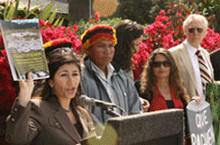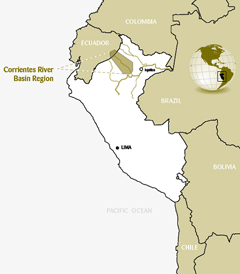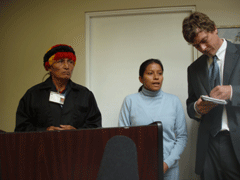The Price of Oil in the Amazon
Air Date: Week of June 1, 2007

While lawyers and plaintiffs look on, Atossa Soltani, founder of Amazon Watch, reveals violations by Occidental Petroleum based on information gathered by a team of experts in May 2006. (Photo: Antoine Bonsorte)
For almost three decades, Occidental Petroleum has pumped oil out of the ground from hundreds of wells in the Peruvian Amazon. The company sold the drilling rights in 1999 but eight years later, the indigenous Achuar people from the area are suing Occidental in the United States for harming their health and poisoning their water and land. Living on Earth host Steve Curwood talks with Earthrights International attorney Marco Simons about the suit.
Transcript
GELLERMAN: It’s Living on Earth. I’m Bruce Gellerman. Beneath the vast Amazon rainforest are rich fields of crude oil and gas mixed with hot, salty, water and heavy metals. For nearly 40 years, oil companies including PetroBras, Harken Energy, Burlington, Hunt Oil, and Occidental Petroleum have been drilling in the remote rainforests of Brazil, Ecuador and Peru. The Achuar people, who live deep in the Amazon basin of Peru, know the effects of foreign companies’ exploration. Until 1999, Occidental Petroleum drilled in the region and then sold its rights in the Achuar territory to another company.
To get there, you start in the city of Iquitos, the gateway to the Peruvian Amazon and travel until the road ends. From there, it’s up river. Even by fast boat it will take you at least 24 hours to reach the oil-rich Achuar land. Now, eight years after Occidental left the region, the Achuar are suing the company, claiming the drilling has poisoned their people and polluted their homeland and waterways. Marco Simons is legal director for Earthrights International and one of the attorneys representing the Achuar. Living on Earth host Steve Curwood recently spoke with Mr. Simons about the lawsuit.
CURWOOD: Let’s begin with human health. What do the Achuar say happened to them as a result of the oil activity on their land in northern Peru?

The indigenous Achuar territory lies in the Corrientes River Basin of the Peruvian Amazon. (Courtesy of EarthRights International)
CURWOOD: Now Occidental Petroleum says it has no scientific data of any negative health effects resulting from its operations in Peru.
SIMONS: Yeah, I’m not sure how they can say that because they now have the results both of the studies that we conducted and of the studies conducted by the Peruvian government itself. So, at this point their denials are ringing a bit hollow.
CURWOOD: So what was the pathway for this lead poisoning to get into the communities?
SIMONS: Well, we’re still exploring the precise vectors but it looks like one of the primary methods of contamination was the discharge of what’s known as produced waters. And when you drill for oil what comes out of the ground is not just crude oil. It’s mixed in with a large amount of water, and heavy metals, and salts. And this goes through what are called separation batteries in order to extract the crude oil. And then they discharge the rest of it as produced waters.

While lawyers and plaintiffs look on, Atossa Soltani, founder of Amazon Watch, reveals violations by Occidental Petroleum based on information gathered by a team of experts in May 2006. (Photo: Antoine Bonsorte)
CURWOOD: Now, what are the damages the Achuar claim they suffered beyond their own personal health problems?
SIMONS: Well, the health problem is the major complaint, obviously, but it extends far beyond that. The Achuar have noticed over the years that the fish in their rivers have declined in yield and also declined in quality. I talked to many people in my visit to the region who describe cutting open fish and when they cut open the fish it’s pure petroleum inside. When they cook the fish, they become hard because of the hydrocarbons inside. And so they, to a person, everyone commented on the decline of the fish stocks over the years and this is the main protein staple of these Achuar communities.
CURWOOD: So, Achuar lived along side Occidental Petroleum for decades there in the Peruvian Amazon and the company is quick to point out that it’s sold its oil rights and facilities in the region eight years ago to the Argentine company Pluspetrol. So why did you wait until now to file your lawsuit?
SIMONS: First it took a while for the Achuar to really become cognizant of their rights as a people. There’s been a growing recognition of indigenous people’s rights in Peru and throughout the Amazon over the last decade. And second, it’s only recently that the full scale of the health impacts on the Achuar population has become known. For years the Achuar have been in dialogue with Occidental Petroleum. But Occy has always said, “We don’t have any scientific evidence of any harms to the Achuar people from our operations.”

Tomás Maynas Carijano, Achuar community elder; Petronila Chumpi, an interpreter, and Marco Simons, Legal Director for Earthrights International at the announcement of the Achuar suit against Occidental in Venice, California. (Photo: Ingrid Lobet)
CURWOOD: Now, what about this Argentinean company Pluspetrol that has taken over from Occidental Petroleum in the area? As I understand it they have signed an agreement to clean up the area. It’s going to cost them, what, 200 million dollars? In your opinion, what will be left to do after that money is spent?
SIMONS: Well, it’s important to note that the agreement that Pluspetrol signed with the Achuar essentially only applies to Pluspetrol’s operations. So, while Pluspetrol has agreed to clean up its own mess and to stop the practices that contribute to pollution on an ongoing basis Pluspetrol has not agreed to clean up everything that Occy left behind. And so that still remains for Occy to do. Besides which even if Pluspetrol were to remediate the environment there is still the human health aspects of this which have not been accounted for by the agreement with Pluspetrol. The Achuar need medical care. They need monitoring of their medical conditions to ensure that children who are suffering from lead poisoning get the appropriate treatment. And finally, of course, there are past harms which can not be remediated by cleaning up the mess now. And the Achuar are seeking compensation for that and that compensation is largely Occy’s responsibility.
GELLERMAN: Marco Simons, legal director for Earthrights International, spoke with Living on Earth host Steve Curwood. We contacted Occidental Petroleum for a response but they declined our request for an interview. However, a company spokesman quoted in the Los Angeles Times, said the lawsuit contains numerous inflammatory statements and unfounded conclusions and told Reuters its “operations were consistent with Peruvian government requirements and with internationally-recognized standards for oil and gas operations.”
[MUSIC: Q&A: Dave Crossland “Easy Money” from ‘Pearl’ (Road Monkey Music - 2006)]
Links
Occidental Petroelum Corporation
Living on Earth wants to hear from you!
Living on Earth
62 Calef Highway, Suite 212
Lee, NH 03861
Telephone: 617-287-4121
E-mail: comments@loe.org
Newsletter [Click here]
Donate to Living on Earth!
Living on Earth is an independent media program and relies entirely on contributions from listeners and institutions supporting public service. Please donate now to preserve an independent environmental voice.
NewsletterLiving on Earth offers a weekly delivery of the show's rundown to your mailbox. Sign up for our newsletter today!
 Sailors For The Sea: Be the change you want to sea.
Sailors For The Sea: Be the change you want to sea.
 The Grantham Foundation for the Protection of the Environment: Committed to protecting and improving the health of the global environment.
The Grantham Foundation for the Protection of the Environment: Committed to protecting and improving the health of the global environment.
 Contribute to Living on Earth and receive, as our gift to you, an archival print of one of Mark Seth Lender's extraordinary wildlife photographs. Follow the link to see Mark's current collection of photographs.
Contribute to Living on Earth and receive, as our gift to you, an archival print of one of Mark Seth Lender's extraordinary wildlife photographs. Follow the link to see Mark's current collection of photographs.
 Buy a signed copy of Mark Seth Lender's book Smeagull the Seagull & support Living on Earth
Buy a signed copy of Mark Seth Lender's book Smeagull the Seagull & support Living on Earth

